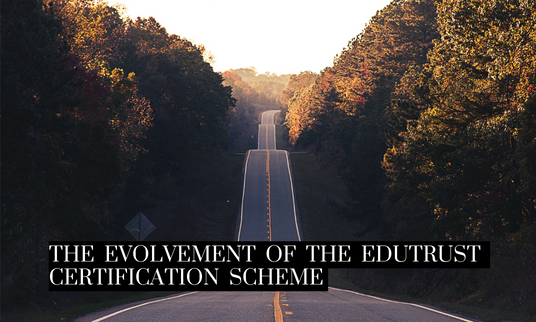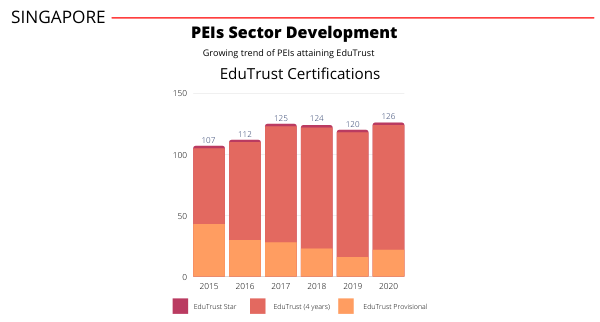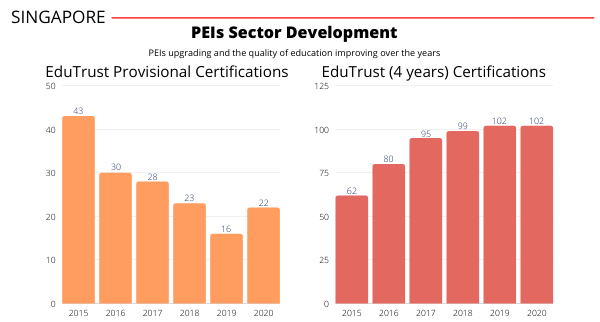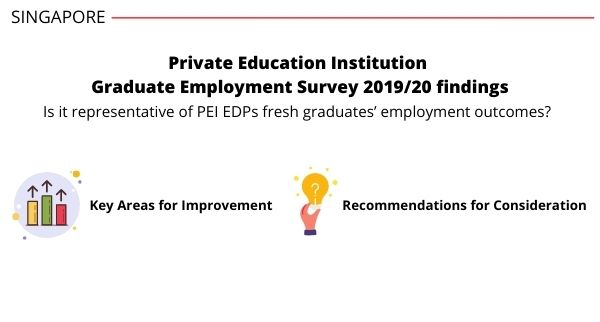In 2009, the Private Education Act (PE Act) was first published in Singapore, along with the formal establishment of the Council for Private Education, now known as the Committee for Private Education (CPE), which aimed to ‘raise standards in the private education sector through effective regulation, industry development and consumer education’[1].
The Enhanced Registration Framework (ERF), which is mandatory for Private Education Institutes (PEIs), together with the voluntary EduTrust Certification Scheme (EduTrust) was introduced [2]. When the EduTrust was first introduced, its focus was to allow PEIs to demonstrate that they had achieved higher standards in key areas of management and the provision of educational services[2]. There are 3 types of awards that PEIs may attain depending on the scores obtained under the EduTrust: EduTrust Provision, EduTrust and EduTrust Star. To date, only 2 PEIs, James Cook University and Lasalle College of the Arts, have attained the EduTrust Star.
When the Guidance Document 2 was first introduced as the standard for EduTrust, it was largely prescriptive in nature, with examples of evidences and notes for many criterions, which served as a guide to PEIs applying for the EduTrust. PEIs were able to understand clearly the various guidelines and its expectations, but at the same time, it gave rise to some rigidity in applying the standards.
In October 2016, Singapore saw a tightening in requirements for the private education industry through new measures introduced by CPE, raising the financial requirements to operate as a PEI [4]. Where a credit rating of CA3 (by Dun and Bradstreet) was previously a pre-requisite to apply for the EduTrust, this requirement was adjusted and moved from voluntary to mandatory via the ERF, enforcing all registered PEIs and aspiring PEIs to have higher financial ability and performance in order to operate in the private education industry.
The changes also affected PEIs that were offering External Degree Programmes (EDPs), pathway and articulation programmes (into EDPs) by requiring such PEIs to attain the EduTrust (4-year) Certification in order to continue offering the programmes. Additionally, entry requirements for pathway and articulation programmes were raised and were more clearly stipulated in the regulations [4]. This move sought to enhance protection for students and raise academic quality by ensuring students entering into degree programmes are prepared to meet the objectives and understand the course contents [5]. Due to this, many PEIs that previously did not apply for the EduTrust had to undergo the EduTrust in order to continue offering EDP programmes, otherwise they had to forego these programmes as part of their offerings.
These PEIs were also mandated to participate in CPE’s graduate employment survey for PEIs offering EDPs, in a bid to enable prospective students to make more informed education and career choices through the release of the results by CPE [4].
It was at this time that CPE also announced only PEIs that have at least a 4-year ERF registration period would be able to apply for the EduTrust, along with a new version of the Guidance Document [4]. This means that new entrants to the private education sector would only be able to apply for EduTrust at earliest 2 years after registering themselves with CPE, on the assumption that they would be able to achieve a 4-year ERF registration period.
In February 2017, CPE released the enhanced EduTrust standards, known as the EduTrust Guidance Document version 3, which placed greater emphasis on academic processes and student outcomes in order to strengthen the protection of students and increase information transparency for prospective students [6].
A new criterion on Achievement of Student and Graduate Outcomes was introduced, which holds a 15% weightage in the EduTrust, measures how PEIs track, review and improve the performance and outcomes achieved by their students [6]. The standards in the revised Guidance Document were also less prescriptive in nature, with lesser guiding notes and the removal of evidence examples.
With the standards being less prescribed, does this mean that it is easier to attain the EduTrust Certification? For PEIs that have undergone the EduTrust under the Guidance Document 2, at face value, it would not seem that these PEIs would have difficulties in meeting the enhanced requirements. However, from 2020 to April 2021, 15 PEIs had their EduTrust award downgraded, lost, or deregistered. While this number may seem small, there are a total of 312 PEIs registered with CPE under ERF, out of which there are only 120 have EduTrust (provisional, 4 years or star) as at August 2022. This postulates that even though the standards are less prescribed, it is not “easier” to achieve the award.
In July 2019, further enhancements to the EduTrust Certification Scheme were made to reduce compliance burden and operating costs for PEIs, where PEIs with at least 2 consecutive terms of EduTrust (4 year), would undergo a reduced scope under the Guidance Document 3 [7]. While it is something most PEIs welcome, it also poses a risk as PEIs lose focus on the areas that are not being assessed during the EduTrust.
It is expected that the both the ERF and EduTrust will continue to evolve as the industry matures in its journey towards quality and increasing importance on academic quality and student outcomes. EduValue has 10 years of experience handling ERF and EduTrust Certification, with more than 40 clients, consulting and assisting clients in their ERF and EduTrust journey, undergoing on average 25 site assessments (both ERF and EduTrust) per year, EduValue is well positioned to work with PEIs in their journey towards process improvements to meet the changing quality assurance needs in the private education landscape.
References
[1] https://web.archive.org/web/20170216062232/https://www.cpe.gov.sg/about-us/key-milestones
[5] https://studyportals.com/blog/4-ways-to-help-incoming-students-meet-university-entry-requirements/
[7] https://www.ssg-wsg.gov.sg/news-and-announcements/18_Jul_2019.html
Written By Jasmine, Industry Research Team





